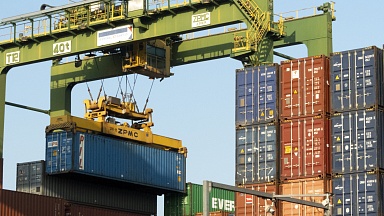Ironically, just two years ago, Bloomberg mocked its transport costs as higher than shipping, completely overlooking the priceless value of safety and speed.
Over 2 billion people in more than 160 countries celebrate Christmas, and a small Chinese city called Yiwu, with a population of under 2 million, produces 80% of the world’s Christmas decorations, providing around $70 billion worth of goods globally each year.
That’s an amazing lever, isn’t it? However, this year, due to the Red Sea Crisis, Yiwu’s market share could rise to 100% in the EU.
Yiwu, located in Zhejiang, a coastal province near Shanghai, is the heart of Christmas decoration production. Typically, orders are placed in February or March, shipped by July, sold by wholesalers to retailers between August and October, and finally stocked on shelves before Christmas.
But this year, to avoid the conflicts in the Red Sea, many ships are now being rerouted around the Cape of Good Hope, with some even using Arctic routes. These detours add over 4,000 miles to shipping journeys. According to Reuters, average transit times have increased by about 50%, making it likely that Yiwu’s Christmas decorations will miss the holiday season.
Fortunately, Yiwu is one of the starting points for the China-Europe freight trains, a 13,000-kilometer railway network that delivers goods directly to Germany, France, and Spain in just 21 days. This rail line has become a crucial alternative to traditional shipping, with more European retailers turning to Chinese products. According to Yiwu Customs data released on December 19, the city’s trade volume reached over $70 billion in the first 11 months of 2024, a 17.6% year-on-year increase.
Most of the transportation needs of these new orders are met by rail. China Railway Group reports that between January and July, the China-Europe freight trains ran 11,403 trips, transporting 1.226 million TEUs, with year-on-year increases of 12% and 11%, respectively. While the railway company has raised 20% prices to manage demand, many Chinese businesses are still desiring to secure more space.
Ironically, just two years ago, Bloomberg called this rail project a waste of money, as it was twice as expensive as sea shipping. But now, safety and speed have proven priceless. By December 2024, the China-Europe freight trains have reached 227 cities in 25 European countries and more than 100 cities in 11 Asian countries, covering the entire Eurasian continent and ensuring that trade between Asia and Europe can continue regardless of disruptions in the shipping industry.
Meanwhile, U.S. retailers are nearing the edge. Despite Yiwu-made Christmas decorations being cheaper than domestic ones in the U.S., newly imposed tariffs against China have significantly increased costs for American retailers.
A December 21st Bloomberg report revealed that Party City, which sells costumes and party goods, filed for bankruptcy, planning to close approximately 700 stores. This could trigger a vicious cycle in the retail industry, as competitors are forced to offload inventory. If several retailers do this at once, it floods the market with discounted products, forcing others to lower their prices, ultimately weakening profits.
The situation is already unfolding. U.S. furniture retailer Conn’s was among the first to start dumping inventory after filing for bankruptcy in July. The trend accelerated in September with Big Lots, followed by Eastern Mountain Sports and Bob’s Stores the following month, all holding going-out-of-business sales.
No matter what, we hope everyone enjoys a perfect Christmas, and that every child, regardless of color or belief, can enjoy the decorations with reasonable prices, and the priceless gift of safety.




